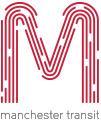 | |
| Founded | 1973 |
|---|---|
| Headquarters | 110 Elm St, Manchester, NH |
| Locale | Manchester, New Hampshire |
| Service area | Greater Manchester, NH |
| Service type | bus service, paratransit, express bus service |
| Routes | 13 |
| Destinations | Greater Manchester, Concord & Nashua, NH |
| Hubs | Veterans Park |
| Fleet | Gillig 29' Low-Floor 1990 International Wayne 1992-1995 International Navi-Star Thomas All-American Blue Bird, IC 2000 International Navi-Star Thomas |
| Annual ridership | 484,474 (2016) [1] |
| Fuel type | Diesel, biodiesel |
| Chief executive | Michael Whitten |
| Website | mtabus |
The Manchester Transit Authority, or MTA, is a public transportation provider in Manchester, New Hampshire, United States. It was founded in 1973 and operates 13 regular bus routes through the city, including a free downtown circulator, which was rebranded as the Green DASH (Downtown Area Shuttle) in 2011. In general, service is hourly, with more frequent service along corridors served by multiple routes, and especially on the Green DASH.
Contents
It is a hub and spoke system that meets downtown at Veterans Park (labeled as Center of NH on southbound departing lines) with one line departing from the nearby Canal Street Transportation Center.
Service is generally limited to the city of Manchester, with a few lines extending into the neighboring towns of Bedford, Goffstown, Hooksett and Londonderry, and two express lines running to Concord and Nashua. Since July 2013, the MTA has offered weekday service between Concord and Manchester-Boston Regional Airport, with most trips also stopping at the Center of NH hub in downtown Manchester, from 3:30 a.m. until 12:45 a.m. [2] The neighboring suburb of Bedford contributed funding to the MTA until 2010, and service coverage was significantly reduced within the town the following year. As of 2009, 97% of Manchester residents lived within one-quarter mile of an MTA bus line. [3]

The MTA is the public successor to Manchester's private bus service, which reached a peak annual ridership of 15.1 million in 1948, and the Manchester Street Railway that existed until 1940. The MTA was created by the City in May 1973, following requests by the private Manchester Transit bus provider for public subsidies. [4] As of 2005, the MTA served an average of 1,905 riders each weekday, though ridership has grown since that time despite budget cutbacks by the city and subsequent service cutbacks. [5] Ridership in 2011 had increased 21% over 2004, growing from 382,979 to 462,109 total rides. Service peaked for the decade in 2009 with 531,961 rides before falling as a result of service cuts in 2010 and recovering slightly in 2011. The general trend during the period, however, has been a growth in ridership. [6] In recent years, the MTA has sought to expand its ridership with new routes, such as the Green DASH and Concord Express, that are aimed at riders who might otherwise choose to drive.
In addition to the 13 public transit routes, the MTA operates a StepSaver paratransit service and two free Shopper Shuttle routes that operate three days a week.